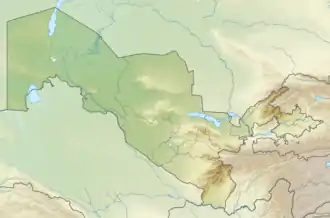Kugitang Svita
The Kugitang Formation or Group (Russian: Kugitang Svita) is an Oxfordian geologic formation in Tajikistan and Uzbekistan and a geologic group in Turkmenistan. Dinosaur remains diagnostic to the genus level are among the fossils that have been recovered from the formation.[1]
| Kugitang Svita | |
|---|---|
| Stratigraphic range: Late Oxfordian-early Kimmeridgian ~ | |
| Type | Formation or group |
| Sub-units | Kurek Formation (Turkmenistan) |
| Lithology | |
| Primary | Limestone |
| Other | Mudstone |
| Location | |
| Coordinates | 38.5°N 68.6°E |
| Approximate paleocoordinates | 43.2°N 73.2°E |
| Region | Lebap (Turkmenistan) Kugitang, Shirkent (Tajikistan) Kashkadarya (Uzbekistan) |
| Country | |
| Type section | |
| Named for | Kugitang, Kugitang Mountains |
 Kugitang Svita (Uzbekistan) | |
Fossil content
Among the following fossils have been found in the Kugitang Svita:[2][3]
- Dinosaurs
- Chodjapilesaurus krimholzi
- Gissarosaurus tetrafalangensis
- Ichnofossils
- Megalosauripus uzbekistanicus
- Mirsosauropus tursunzadei
- Regarosauropus manovi
- Shirkentosauropus shirkentensis
- Therangospodus pandemicus
- Insects
- Shurabia hissarica
- Reef fauna
- Apocladophyllia koniakensis
- Calamophylliopsis kyrvakarensis
- Dorsoplicathyris farcinata
- Kobyastraea lomontiana
- Tubegatanella repmanae
- Bivalvia indet.
See also
- List of dinosaur-bearing rock formations
- Bissekty Formation
- Bostobe Formation
- Qiketai, Toutunhe, Shishugou and Qigu Formations, fossiliferous formations of the Junggar Basin, Xinjiang
- Haifanggou Formation, Hebei Basin, Hebei
- Oxfordian formations
- Oxford Clay, England
- Tendaguru Formation, fossiliferous formation of Tanzania
- Cañadón Calcáreo Formation, fossiliferous formation of the Cañadón Asfalto Basin, Argentina
References
- Weishampel et al., 2004, pp.517-607
- Kugitang Group at Fossilworks.org
- Kugitang Formation at Fossilworks.org
Bibliography
- Weishampel, David B.; Peter Dodson, and Halszka Osmólska (eds.). 2004. The Dinosauria, 2nd edition, 1–880. Berkeley: University of California Press. Accessed 2019-02-21. ISBN 0-520-24209-2
Further reading
- F. Fanti, M. Contessi, A. Nigarov and P. Esenov. 2013. New data on two large dinosaur tracksites from the Upper Jurassic of eastern Turkmenistan (Central Asia). Ichnos 20:54-71
- D. S. Aristov, T. Wappler, and A. P. Rasnitsyn. 2009. New and Little-Known Grylloblattids of the Family Geinitziidae (Insecta: Grylloblattida) from the Triassic and Jurassic of Europe, Asia, and South Africa. Paleontological Journal 43:418-424
- V. P. Novikov and M. R. Dzhalilov. 1988. Litologicheskaya interpretatsiya mestonakhozhdeniy sledov dinozavrov i Tadzhikistane [A lithological interpretation of localities with dinosaurian traces in Tajikistan]. In T. N. Bogdanova, L. I. Khosatzky, & A. A. Istchenko (eds.), Sledy Zhiznedeyatel'nosti i Dinamika Sredy v Drevnikh Biotopakh. Trudy XXX Sessii Vsesoyuznogo Paleontologicheskogo Obshchestva i VII Sessii Ukrainskogo Paleontologicheskogo Obshchestva [Fossil Traces of Vital Activity and Dynamics of the Environment in Ancient Biotopes. Transactions of the XXX Session of All-Union Paleontological Society and the VII Session of the Ukrainian Paleontological Society]. Naukova Dumka, Kiev 58-69
- S. T. Khusanov. 1987. Pozdneyurskie skleraktinii rifogennykh otlozheniy yuzhnogo i zapadnogo Uzbekistana [Upper Jurassic Scleractinia from reefal buildups in southern and western Uzbekistan] 1-92
This article is issued from Wikipedia. The text is licensed under Creative Commons - Attribution - Sharealike. Additional terms may apply for the media files.